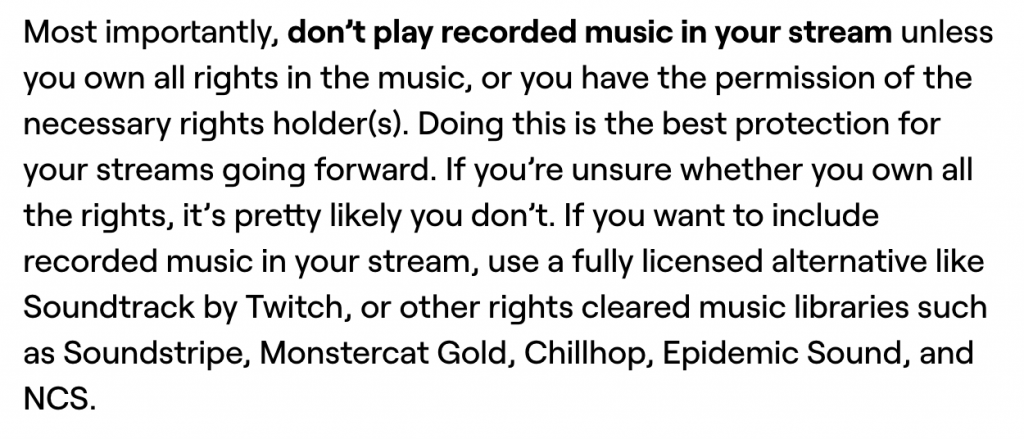
Calling All Twitch DJs!
2020 has been a year of dramatic changes to the way the DJ community works, and one of the big trends has been a shift towards a lot of livestreaming of sets. There are various platforms, but the one which has emerged as the most popular is Twitch.
However, some DJs have warned for a while that its an imperfect solution, and a recent blog from Twitch seems to back that up.
If you stream on there, or are considering doing so, I recommend you go and read the whole thing – but for those of you too lazy to do so, here’s the key points, with my interpretation of them!
* They start off explaining exactly what the DMCA is (The Digital Millennium Copyright Act), and why they issue takedowns and bans against users who use copyrighted content without permission
* In May this year, the number of DMCA notifications jumped from a few dozen per year to thousands per week, mainly from major record labels, and they don’t expect this to slow down. They say

* They analysed the notifications. 99% were for tracks that streamers were using in the background of their streams (rather than being the focus of attention). They say
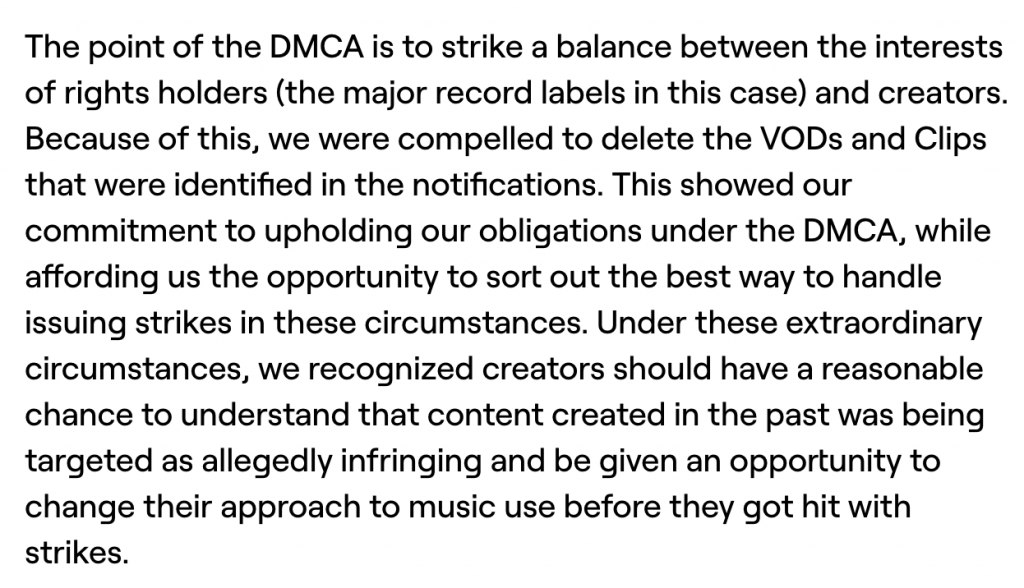
* They take responsibility for a warning email some of you may have received, which was not very comprehensive, leading to a lot of confusion and uncertainty amongst Twitch users. They apologise for not having better tools for creators on Twitch to manage their libraries of content.
* Probably most importantly, the next section talks about how to avoid DMCA notifications. From a DJ perspective, its not exactly ideal…
* They go on to talk about the new tools they are working on to give creators more control over the recorded content on channels, to make it easier for creators to control what audio shows up in recordings. They mention Soundtrack – rights-cleared music for use in Twitch. And third, they mention an improved mechanism for challenging copyright claims.
* The next bit is probably the most directly relevant for DJs

* Then they go on to advise people to learn more about copyright and how it might impact your channel.
Where does that leave DJs?
When a DJ uses Twitch, they are breaking a very clear rule on the site terms & conditions.

It is interesting that they don’t directly address the topic of DJ sets here, but then it represents a tiny fraction of their total streamers. The sense that I get from this latest update is that they are setting out their stall and warning people “this is the way it is, and there’s no guarantee we get to a point where use of uncleared music is “legal” per se”.
This has been known for some time, but the way Twitch works is so rewarding for regular DJ streamers, with raids, the community building and so on, that most are happy to take their chances, and accept that old videos will be most likely be muted. After all, Facebook and Instagram have exactly the same problem, plus also regularly cut people off mid-stream (which so far Twitch doesn’t do). Mixcloud is the only existing platform I am aware of that is fully licensed, but has nothing like Twitch’s user base or level of functionality.
So ultimately, this update amounts to “we’re helping improve the tools for you to manage your libraries to avoid strikes for old content, but this is the deal going forward”.
Can they make a deal? Sure – they could. They are backed by Amazon, who have enough money and clout to make anything happen if they want to.
Do they want to make a deal? I’m not so sure. It might be expensive and have ramifications for the vast majority of their user base, just to cater for a tiny percentage. They may see it as unnecessary hassle and separate from their core mission.
As with these things, only time will tell – for now, my personal advice would be to proceed with eyes open, and don’t put all your eggs in one basket, because if Twitch decide to take that basket away…

DJ Tech News – October 2020!
As always, we here at the Heavy Hits record pool have our ears to the ground to find all the best news in DJ tech. This month, there’s no denying what the biggest stories are – Pioneer finally launched their CDJ3000 Nexus players, and the long-awaited follow-up to the DJM S9, which they have called the DJM S11 (a nod to the film This Is Spinal Tap perhaps?).
Both look like serious pieces of kit – and come with serious price tags to match. Technology like this is years in the planning, and so the criticism they have faced from some quarters for launching such expensive equipment in the middle of a pandemic (which has devastated the incomes of the global DJ community, and the clubs that they play in) is somewhat unfair. These launch dates will have been planned long before anyone had ever heard of Covid-19.
But anyway, to the actual equipment, starting with the mixer. A friend of the blog, Serato’s DJ Blakey, gave us a brilliant walk through in this video – I had planned to visit him in the studio this week, but unfortunately London has just tightened its lockdown and so it will be a while before I can have a play myself!
As you can see, it is a proper piece of kit, with some awesome new features! A touch-screen (with Kaos Pad style FX functionality), scratch banks, a clever way to achieve 4 deck control with just 2 channels on the mixer, FX stacking, splitting the pads for multiple functions, and lots more besides.
The S9 is by far the most popular mixer amongst scratch DJs, and despite Rane’s efforts with the recent Seventy mixer, you suspect that many will be looking to upgrade from their S9s soon, now that it has a true successor. Certainly, the reaction from the DJ community has been very positive so far!
The price tag is a consideration though – retail is $1999 in the USA, and £1899 in the UK! The Rane Seventy can be picked up for $1499/£1349.
The Pioneer CDJ3000 Nexus came up in the September round-up, and is fully released now. This one seemed to split the room a bit more amongst people who hadn’t tried it, but the users I know who have had a play are impressed.
For an in-depth review, head to this awesome video by Digital DJ Tips. And if you want to see what I mean about this CDJ splitting the room, have a read of the comments!
The biggest complaints seem to be that it doesn’t bring much new to the table, and the high cost of a unit – well over £2k. But then – that’s roughly what a CDJ2000 Nexus 2 cost, so what price point did people expect?
I will reserve personal judgement until I get to play on them, but as he says in the review – these are largely aimed at the pro user market. Clubs, festivals, gig venues. They have to be built like tanks, and slot in with existing set-ups and workflows. Interesting that they seem to be very upgradable due to the onboard computer chips, and so a whole range of extra features should come in future updates.
Shazam for Humming
Yes, that’s right. You know when you have a song in your head that you heard somewhere, but you didn’t manage to Shazam it while it was playing? You can remember the melody, or a lyric, but you have no way of knowing the song?
Well… Google has just launched a remarkable service where you can hum or sing into the search app on iOS an Android, and it tries to match the song. I tried it myself – I would say it was roughly a 70% hit rate, getting tracks as wide-ranging as Bee Gees, Julio Bashmore, Pixies and Nelly right!
Check out more here
Streaming
In 2020, many DJs are using live-streaming to reach their fans (including the rapidly growing Heavy Hits Twitch channel!), and Mixcloud have announced a ticketed live-streams feature on their platform. More details here – the ability to charge people to access specific streams, much like a gig ticket, will be appealing to more established DJs in particular.
Acieeeeeeed
A fun website has sprung up here – an online 808 drum machine and 303 bass synth emulator, the two classic sounds of the acid house revolution in the late 1980s! Its pretty straightforward to use, and sounds just like the real thing (although with a lot less control over most of the elements).
As always – head to the Heavy Hits record pool to get the best new music!
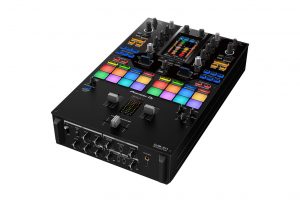
#HeadNHeartDJChallenge – Winners Announced!
After careful consideration, and in an incredibly high-calibre competition, Joel Corry decided on the grand-prize winner of the #HeadNHeartDJChallenge. We actually increased the prize pot, such was the high standard of entrants! Here’s Joel himself to tell you who he picked…
View this post on Instagram
So there we have it!
1st place – DJ Flip – $1000
2nd place – TCHDWN – $500
3rd place – Nedu Lopes – $100
And then the other finalists – Andy Purnell, DJ Perly and DJ Freazer – received $75 each.
And all finalists received annual subscriptions to Heavy Hits Record Pool!
In case you missed it, here is DJ Flip’s awesome winning routine!
View this post on Instagram
Keep tuned into the Heavy Hits Instagram for more great DJ content.

DJ Tech News – Sept 2020!
Every so often I cast my eye around to find the latest news in the world of DJ technology and bring it to the Heavy Hits crew in a nice neat package. Here’s what is going on lately…
Serato Gets A Major Update
Serato 2.4 Beta is out now, you can pick it up here. To my eyes, the most exciting features are the addition of “make audio available to other applications” in the settings – meaning that you can select Serato as an input for livestreaming software like OBS. You can also now use laptop speakers as master out, bypassing your soundcard, which is handy when on the move without speakers. It also introduces more streaming options to add to the Tidal service that has been in place for a while, and advanced MIDI mapping.
Pioneer Tease CDJ3000
Its been a while since Pioneer took a great leap forward – they’e had some dope controllers and mixers, but everyone has been very curious about what is coming in terms of an update to the club standard CDJ2000 and DJM900 units. Well, Pioneer put out these very cryptic short video – not a whole lot given away (although it looks like they are stress-testing those cue buttons plenty!), but you can bet that they will be serious pieces of kit!
View this post on Instagram
Technics and Red Bull collaborate on a limited edition SL-1210MK7 Turntable
For those of you still addicted to vinyl (or just preferring the feel of vinyl with Serato), Technics are putting out a limited run of 1000 of these decks – made in collaboration with Red Bull to celebrate their BC One breakdancing contest. They feature several unique cosmetic customisations, but are basically the same old decks – which is no bad thing, because they are fantastic record players. They’re not cheap though – £899 each! Check them out here.
Neural Mix Come To Mac OS
Previously only available on iOS, this amazing software is now available for Mac users. We’ve mentioned this incredible software on the blog before – it has the potential to be an incredible creative tool for DJs if it becomes a feature in mainstream software.

Tech News!
For obvious reasons, it has been a relatively quiet year for new tech, and it looks like this trend is set to continue for some time…
NAMM 2021 has officially been cancelled, to be replaced by a Believe in Music virtual event. The music trade event was originally scheduled for the week of Jan 18 2021, but with the ongoing Covid-19 pandemic, it isn’t really a huge surprise to see a decision like this reached. Organisers cited the health & safety of NAMM members being a top priority.
NAMM President and CEO Joe Lamond said “While it remains unsafe for us to gather in person in January, Believe in Music week will use new, intuitive technology to connect us all to harness the incredible energy that happens when we come together.”
Companies obviously already have the difficulties of supply chain and workforce disruption to cope with, and now that one of the marquee events of the calendar is not happening, the urgency to have products ready to display there may diminish.
Its not all bad news though – Rane just launched the 72 mk2 and Twelve mk2, updates to their exceptional mixer and digital decks. They fix a few issues from the previous versions (notably on the mixer, adding an external crossfader tension adjust, a baffling omission from the original!) and introduce a host of new and improved features. The Twelve Mk2s now generate control tone for Traktor and Virtual DJ. For a full review, check out this great piece here.

Over at Native Instruments, the company behind the Traktor DJ software, they have just announced that Constantin Koehncke is to become their new CEO, while Robert Linke will be Chief Product Officer & President – both are internal promotions, with the people they are replacing remaining with the company. The statement from the company demonstrates their confidence moving forward – “Native Instruments today is in a very strong place and it’s on this foundation that Constantin and Robert will bring fresh energy, continuing to deliver exceptional products. Their many years of leadership in Marketing and Products and countless successful contributions made them the perfect choice to lead Native Instruments into the future.”
As one of the most innovative DJ and music tech companies in the world, it will be interesting to see what they have in store in the coming years! In the here and now, Traktor Pro 3.4 beta has just introduced the addition of a smart playlists feature.
As always, go get the latest hot tracks from the Heavy Hits pool, and follow me on Instagram!

Mindblowing new tech in Algoriddim’s djay Pro!
Every so often something comes along that just leaves you scratching your head thinking “how the hell does that work?”. Having a rotating plastic disc that you drop a diamond-tipped needle into, and the bumps in the groove convert into music. A smaller plastic disc with a load of 1s and 0s that you fire a laser at. A disc with a control tone that you send to your laptop in order to control the 1s and 0s on your hard drive. All absolutely bonkers when you think about them for a second or two.
Well – here’s another one.
Algoriddim‘s djay Pro app, available across OSX, iOS, Windows and Android, has just unveiled an incredible new feature for the iPhone and iPad app, powered by Neural Mix Technology. For now it is not included in the Mac, Windows or Android apps.
Essentially, you can isolate drums, harmonic content (the instruments in the songs) and vocals, as 3 separate elements. But you can do it in real time, as you mix. So if inspiration strikes, you can do some frankly crazy stuff with no preparation necessary. If that is confusing you, let Crossfader explain in a bit more depth, and demonstrate how it works (and sounds!)
As you can see, it is remarkable. Obviously, the big downside here is that it is built into a software app that few serious DJs currently use, and limited to iOS. But sometimes this is the kind of breakthrough needed to get people to take a new app seriously, or motivate the existing kingpins to develop similar on their software – I have already been on to Serato to register my views!
For a bit more of an idea, here’s DJ Yoda messing about with it on his iPhone over on his Twitch. Really interesting what he was able to throw together in this little experiment. Seems that the era of the mashup may be returning in full effect!
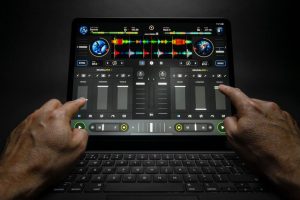
The Livestream Landscape
There’s little doubt as to the major trend in DJing in 2020 – the huge explosion in livestreamed DJ sets. We’ve discussed this phenomenon here on the blog before, but some time on, things are gradually evolving.
The most popular platforms for most people remain Facebook and Instagram, largely because that is where people have an audience, often built and developed over many years. The problems there remain the same as before – copyright takedowns mid-stream are a constant threat unless you have been whitelisted (which seems to be a phenomenon amongst certain high profile DJ accounts on Instagram).
Instagram are widely believe to have instituted a “90 second” rule, and have blogged about their rules and restrictions here. In my experience, Instagram livestreams are often taken down before 90 seconds of the offending song have been played. Which makes the adverts that they have done which prominently feature DJ livestreams a bit… well, maybe a bit misleading.
While Facebook is trigger-happy in ending livestreams, they do seem responsive to allowing the videos to remain online after the fact if you contest the copyright claim – I have generally written something like “Fair use of music, not using whole track, and as part of a DJ performance” when contesting the copyright strike, and almost all of those claims have been dropped. This obviously doesn’t stop the livestream being ended in the first place, so that doesn’t really fix the key issue!
Mixcloud Live is very much a work-in-progress, and has almost no natural audience – it relies on you being able to get people to click through. It also has various logistical issues vs other forms of streaming that make it less appealing – my laptop sounded like it was about to explode when I tried it. Running OBS and Serato at the same time on the same computer is not ideal! Zoom appears to be a popular platform for private DJ sets – be they birthdays, or corporate events for companies that are working from home during the lockdown.

The emerging favourite for DJs seems to be Twitch. It has traditionally been a gamer’s favourite, and from the DJ perspective, the experience is light years ahead of the competition in many ways. Fantastic video and audio quality, great chat functionality, a brilliant mobile app, and much more besides. From the start of the lockdowns, it was clear in their terms of service that DJ sets were against the rules. However, they appeared to actively begin to court DJs and musicians, clearly seeing the possibly huge new audience numbers that could be brought to their platform. They are owned by Amazon, so they could almost certainly thrash out a publishing deal with the labels should they choose to.
Then this week, news emerged of a huge batch of DMCA takedowns against archived content. DJs around the world had a collective minor freak-out, but now that the dust is settling, maybe things aren’t as bad as feared. Twitch tweeted out the following
“This week we’ve had a sudden influx of DMCA takedown requests from 2017-2019. If you’re unsure about rights to audio in past streams, we advise removing those clips. We know many of you have large archives, and we’re working to make this easier.
This is the first time we have received mass DMCA claims against clips. We understand this has been stressful for affected creators and are working on solutions, including examining how we can give you more control over your clips.
We adhere to the DMCA, which requires that we take action on content and streamer accounts upon notice from rights holders, as happened this week. Our guidelines for this have not changed, please reference here“
For more about the DMCA, check this Medium article.
Others took up the discussion, with this insight from Billy Lane.
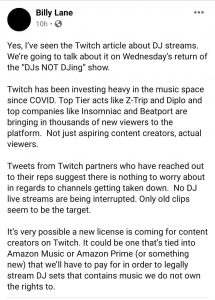
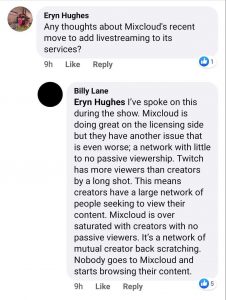
UK underground stalwart Plastician had this to say on the topic – explaining that, ultimately, this is to do with labels choosing how their content should be used and monetised.
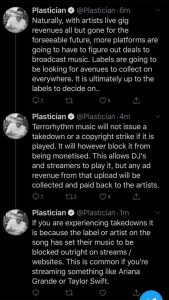
So the long and short of it seems to be that, for now, DJs are relatively safe to continue on Twitch. It was always a dubious legal position over copyright and DJ sets on that platform, and it remains so. Videos don’t appear to be getting stopped mid-flow – which means it has a huge advantage over Facebook and Instagram. Old content may be targeted, and need to be removed – not ideal if you have a big archive which you like to use as a kind of “showreel” to potential bookers and clients. But, at time of writing, the initial wave of panic seems a little unjustified, and the doom-mongers who declared “Twitch is over!” may be a little premature in that judgement.
It is possible that this is the thin end of the wedge, and the scope of takedowns will increase – at which point this becomes far more urgent for the DJ community that is developing on Twitch.
But for now, Twitch remains a very viable option if you are prepared to put the work in to develop a following on the platform. Come and follow my channel here, and go grab the latest heat for your sets from the Heavy Hits pool!
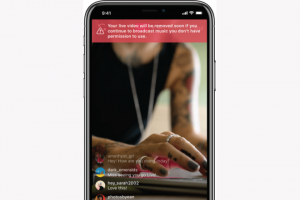
DJ Tech News – May 2020!
This has been a relatively slow time lately for tech news, for pretty obvious reasons, but there’s some pretty cool new bits of kit and tech to report on!
Up first – Numark have launched a pair of budget controllers, the two-channel ProFX and the four-channel Platinum FX. Both feature 6-inch jog wheels, 2 FX paddles, and performance pads. The Platinum FX allows you to switch control with the 2 jog wheels so that they can control all 4 channels, as well as displays on the jog wheels. Other than these differences, they are basically the same. They are bundled with Serato Lite, and look likely to cement Numark’s reputation for providing fantastic budget options, the pricing of these being $199 and $249 respectively.
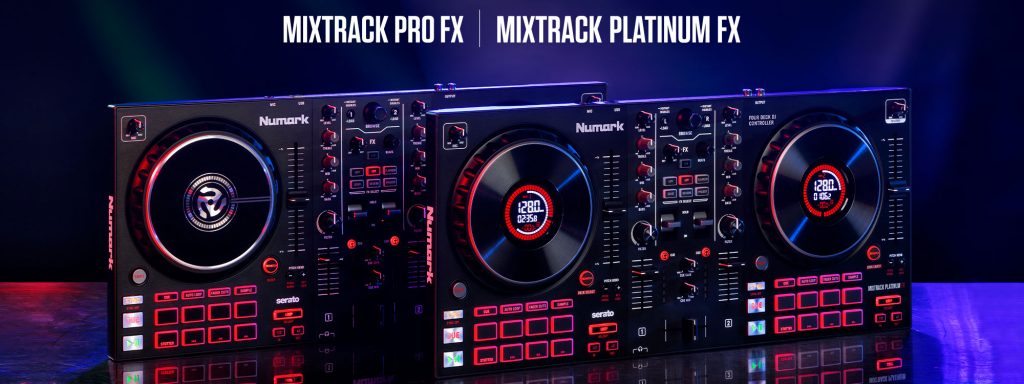
Moving to a very different area of the tech scene, Mastersounds have launched their 3rd generation of rotary Radius mixers, with the Radius 2 ( £799) and Radius 4 (£1089). While still far from cheap, they are considerably closer to being affordable compared to their previous mixers, and offer DJs on a tighter budget the chance to enjoy the amazing sound of their range. The mixers feature a High Pass Filter per channel, a master isolator three-band EQ and high-quality RIAA pres.
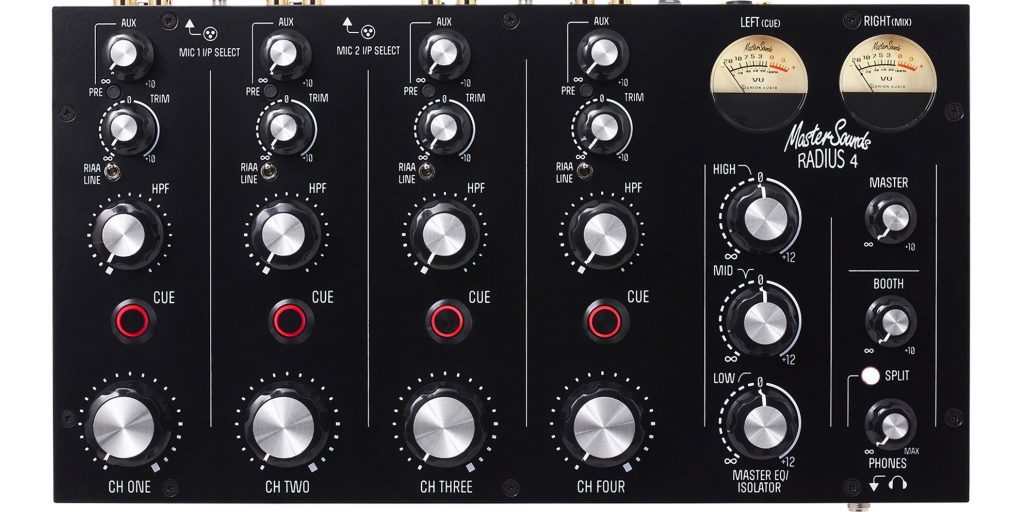
And finally, a fascinating project – Citizen DJ, from the Library of Congress in the USA. There are hundreds of thousands of free-to-use audio samples, arranged into sections. You can go through to pick sounds, scrubbing through a bewilderingly huge wall of samples, and then they have a web browser-based step sequencer, and an incredible array of presets for different style drum patterns and sounds. You can even edit the sample length – I had a lot of fun messing around with it! This is only the Beta, so keep checking back, its a really fun way to make beats using unusual sounds!
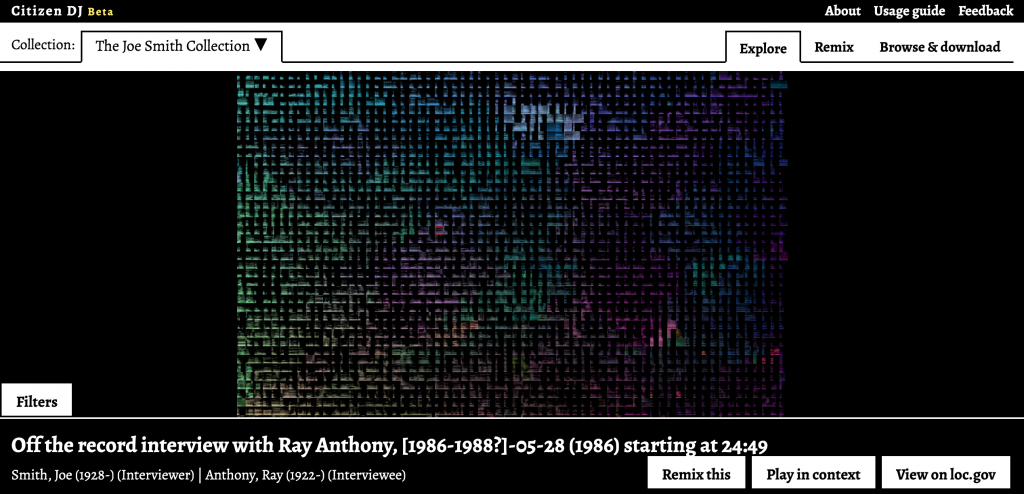
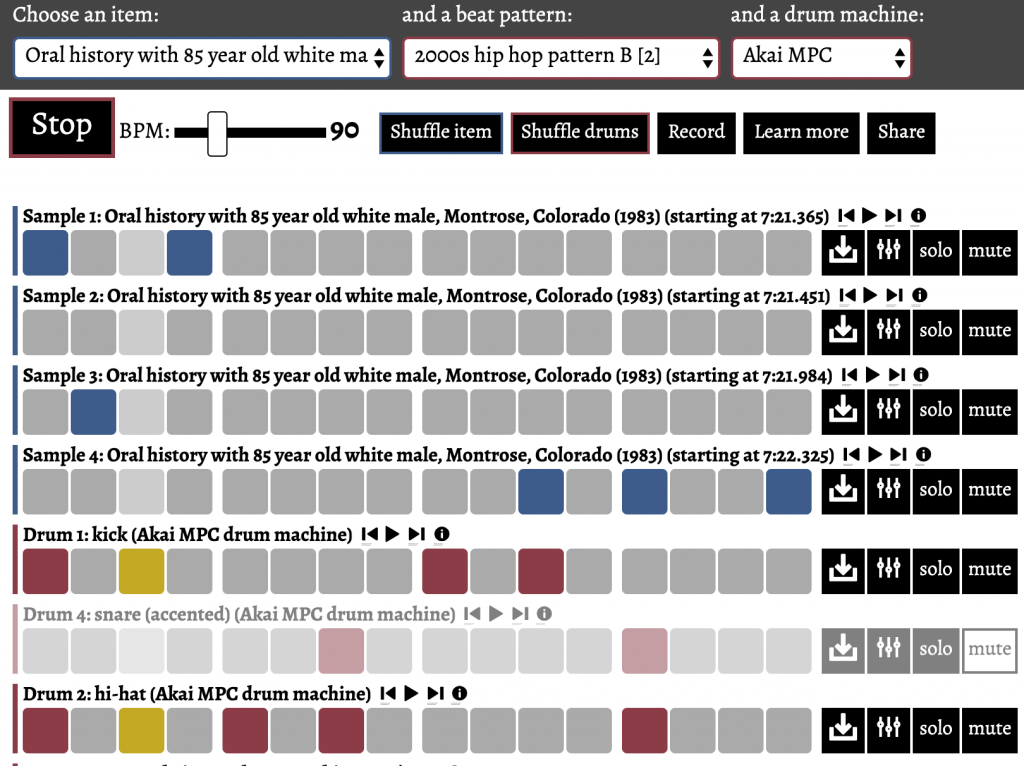
That’s it for now, head over to the Heavy Hits pool for the latest hot tracks, and follow me on Instagram!
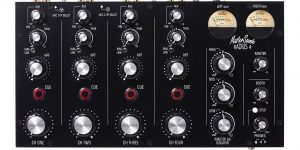
Logic Pro X 10.5 – huge update for Logic!
Logic has long been a serious studio favourite, but in recent years (since Apple took ownership) has seemed a little neglected, and seemed to slip behind rivals like Ableton, with few exciting new ideas, and some relics of an old world such as the horribly dated EXS24 sampler holding it back.
But huge news this week! Logic Pro X 10.5 is out, a free upgrade for existing users, and $199.99 for US customers, a very competitive price.
And it is a serious update, completely revamping many aspects of the program, and introducing many that could be generously described as “heavily influenced” by the competition – a less charitable description would be “shamelessly copies its rivals”… But what matters is, is it any good?
Here’s a quick run through some of the new features
The biggest change is the new “Live Loops” feature. Essentially bringing much of the functionality of Ableton’s session view to Logic, this means you are no longer stuck in Logic’s previously very linear form of composition, and can jam with multiple loops and ideas to come up with ideas, before moving on to your arrangement. Live Loops works with Logic Remote, an iOS app that turns your iPhone or iPad into a controller, and seems to work brilliantly, a huge improvement on simply mouse and keypad.
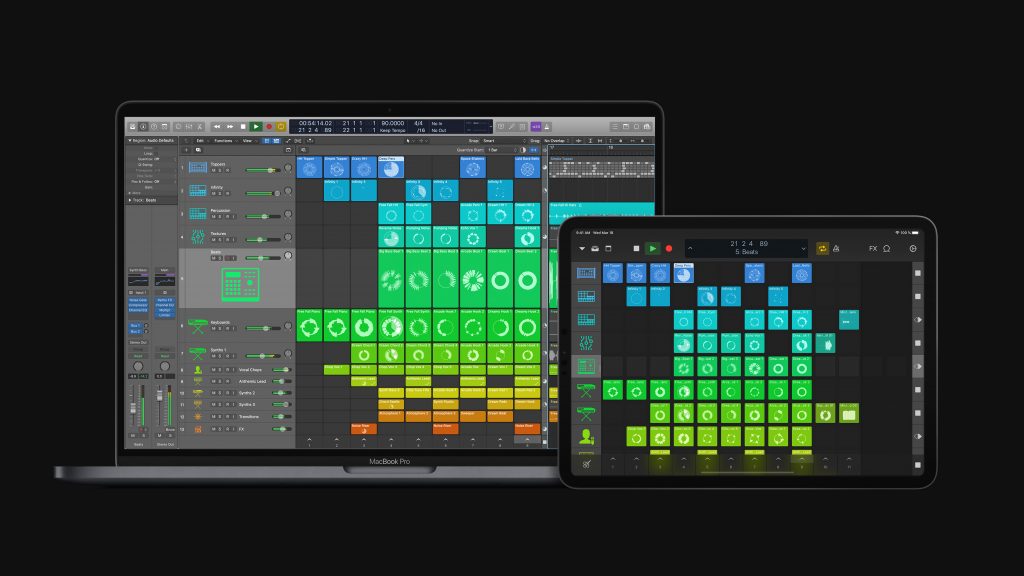
As I mentioned above, the EXS24 is out, and in its place, Sampler and Quick Sampler.
“Producers can use Sampler to create and edit sophisticated multisampled instruments, using elegant drag-and-drop workflows that automate complex production tasks. Quick Sampler is a fast and simple way to turn any individual sound into a playable instrument. Musicians can pick a sound from within Logic, the Finder, Voice Memos, or even record directly into Quick Sampler. With just a few clicks, an imported sample can be trimmed, looped, and played across a keyboard controller, with access to creative sound-shaping controls.”
Early reports suggest both are brilliant, and that Quick Sampler is so good that you might end up just using that, although Sampler looks to have some incredible possibilities for the creative minds out there! Sampler has full backwards compatibility, so if you have EXS24-ready sample sets, you are good to go here too.
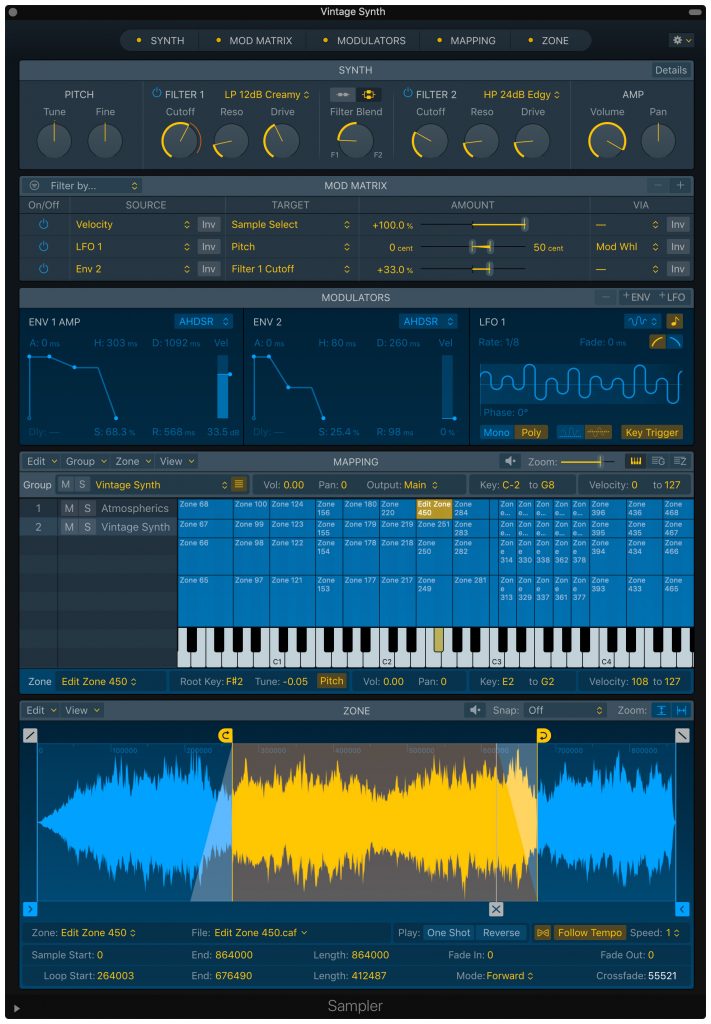
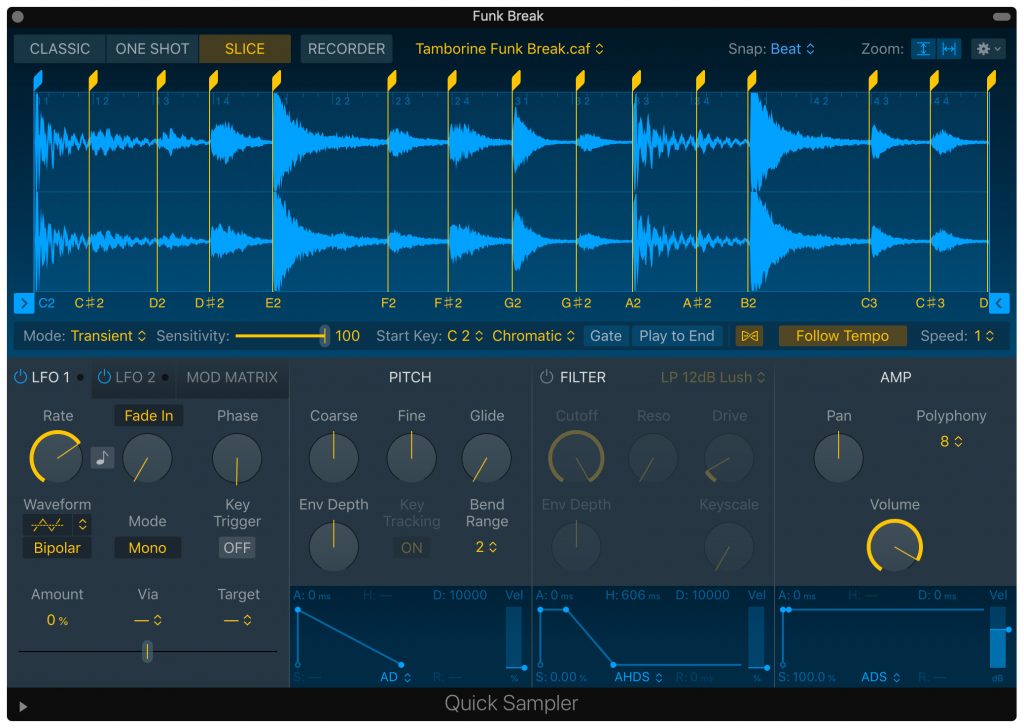
Even more exciting to my eyes, is the new Step Sequencer –
“Step Sequencer is a new editor in Logic designed to make it fun and easy to program drum beats, bass lines, and melodic parts using an interface inspired by classic drum machine workflows. Step Sequencer combines a pattern-based style of music creation with powerful editing options for creating original parts — providing detailed control over note velocity, repeat, gate, skip, playback direction, and randomization.”
Apparently a triumph in how it works, this seems to be a massive bonus for anyone making beat-driven music.
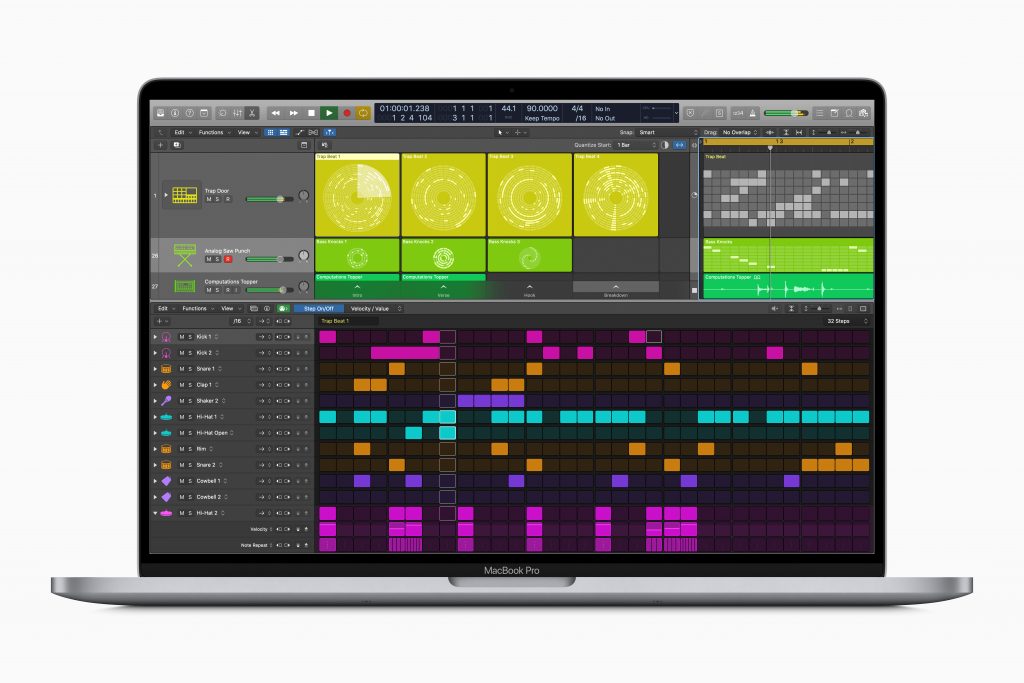
Read more about it here, and for a full in-depth review check out here. One thing is for sure, I’m gonna re-download Logic and give it a go, it looks like Logic is back!
To hear the latest, hottest tracks, remixes and edits, head over to the Heavy Hits pool, and follow me on Instagram
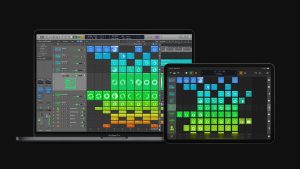
DJ Tech News Update – Rekordbox 6 and Mixcloud Live
There’s been a couple of recent updates to the world of DJ Tech which are worth covering in the blog.
First up, a brand new version of Pioneer Rekordbox is out, version 6. It looks a lot better, with far improved waveforms, but beyond that, this does seem to be a genuinely major update, and they have a fascinating new feature – Cloud Library Sync. With this function, coordinated with Dropbox, you can sync your library across up to 4 devices, allowing you to edit and save on the go. It is the first DJ company to provide this feature, which is very similar in concept to how many store their photos.
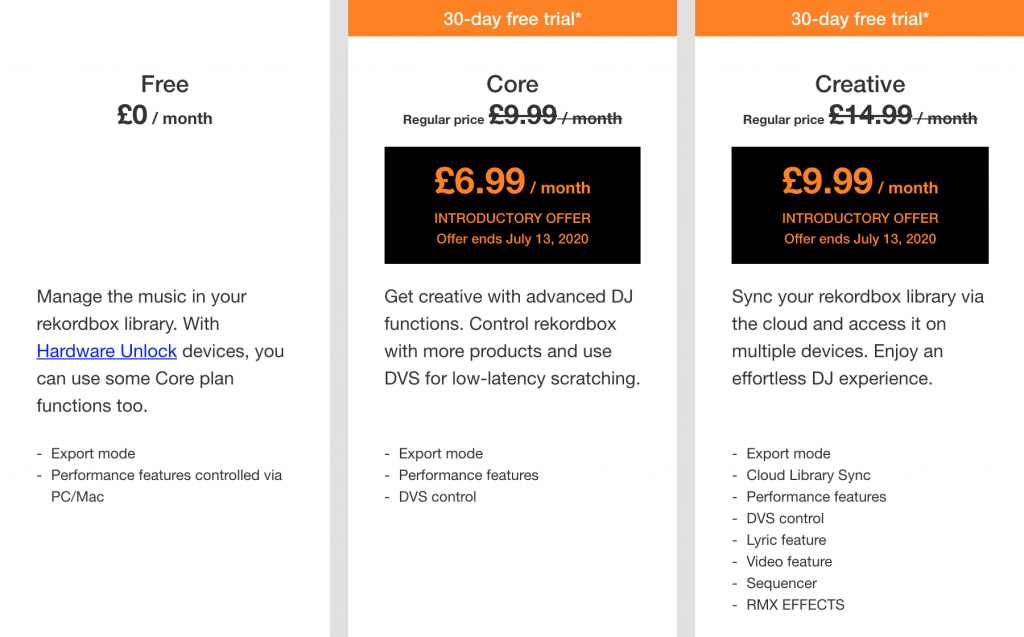
It is a paid function – so it will have to be pretty special to get much uptake. But cloud DJing is something that we have explored before, and with the arrival of 5G, it could well be the future of DJing. So this feature is a logical direction for Rekordbox to take. But how many will want to sign up for a monthly fee to use their software? Recent Denon controllers included WiFi connectivity – presumably the goal is to be able to DJ from your own cloud library via Pioneer devices.
Check out in more depth in this video, and there’s a real deep dive into the software and implications here.
Elsewhere, we have spoken recently about the options available for live-streaming DJ sets online. One of the major issues faced by many DJs is the problem of copyright takedowns terminating broadcasts, and repeat offenders getting their live privileges revoked by social media platforms.
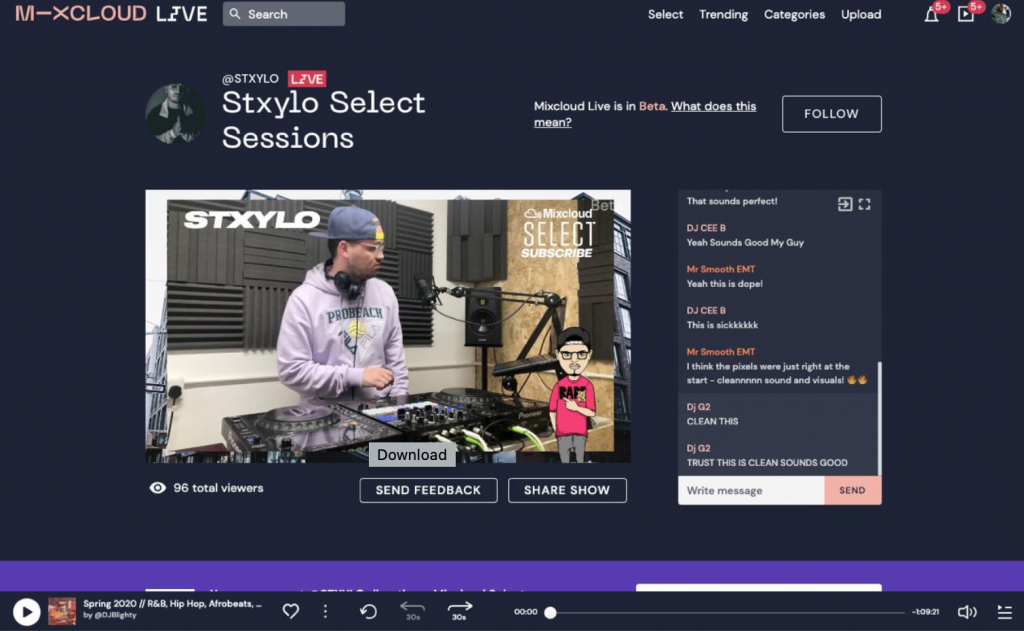
Mixcloud have seen this, and have brought forward the release of their live function, which is currently in beta – so there will be bugs and glitches for now, but expect those to be worked out as more users join.
This move actually makes a lot of sense – they’ve found a way to host DJ mixes and license the music which record companies are happy with, and have introduced a subscription model for premium accounts, including the option to paywall some content for subscribers only. This means that DJs have the possibility of generating some income from fans who are prepared to pay a small amount per month towards their Mixcloud channel.
You are provided with a stream key and url, to use through things software like OBS (covered in this article). You need to have a Mixcloud Pro account, but at the moment they have a 90 day free trial, and it is then $7.99/£9 per month after that.
All in all, these are two really interesting, and potentially game-changing, developments in DJ technology!
Go charge up your crates at the Heavy Hits pool, and head over to my Instagram here.


